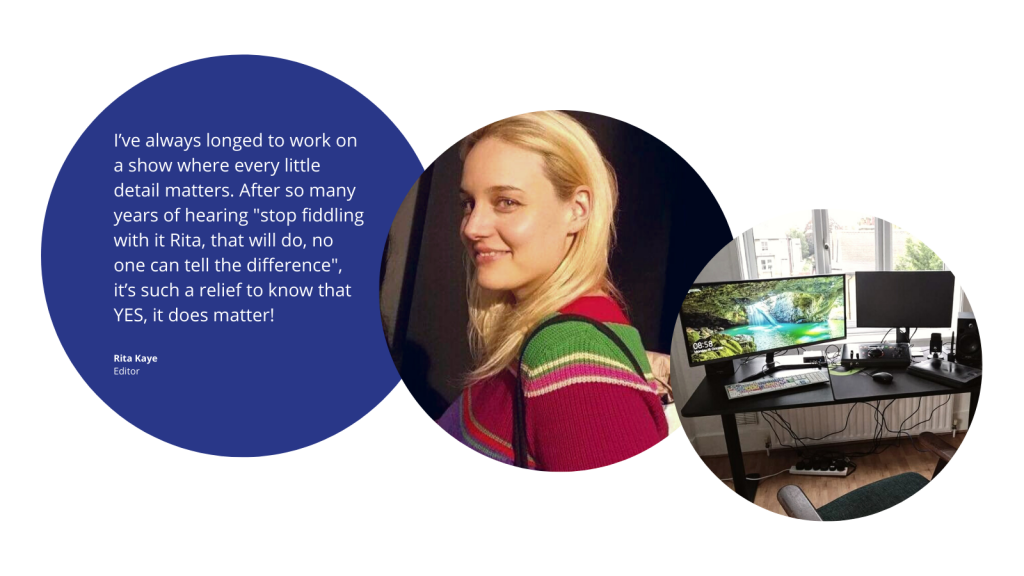Prominent experts spoke on the current state of post-production, highlighting factors which impact the talent and clients Blueberry works with, as well as other industry stakeholders.
Here are our main takeaways from the talks attended (listed at the end of the article).
Shifts in the Industry
Post-production is undergoing extensive pressures and transformations, and it must adapt and recover. The weak pound and the writers’ strike in the US are affecting scripted commissions and productions. There have been reports that a small number of productions have been pulled mid-shoot, or even during post, to the surprise of post facilities. Big players are waiting to see what other names in the industry will do next, thereby slowing down the pace of new commissions during this first half of the year.
Addressing the shortage of skilled professionals
It has became apparent that there is a shortage of highly skilled post-production experts. Many left the industry during the pandemic, and those remaining were booked to capacity. According to the speakers at the Media Production and Tech Show, certain specialised positions are still difficult to fill, such as editors, assistant editors, VFX specialists, post supervisors and post producers. To address the shortage and diversity issues, some post companies have started to train their juniors faster than average, and organisations are developing new initiatives, some mentioned include:
The Academy is a soon-to-launch scheme created by Residence Pictures to simultaneously tackle the diversity and inclusion crisis in the UK post industry, together with the skills gap. The Academy plans to offer a free employability programme, providing hands-on training and access to VFX and post-production roles to individuals from marginalized and underrepresented communities.
The TV Access Project was also praised for helping make productions and facilities accessible to Deaf, Disabled, and Neurodivergent talent – their goal is to reach equity and full representation by 2030.
Training and Mental Health Initiatives
ScreenSkills is offering a range of training and professional development opportunities. We were pleased to hear that they are offering guidance to people returning to the industry or those needing help to plan their next steps after a few years in the same position. There is a greater and much-needed focus on mid-level career progression training, as well as entry-level.
We were also impressed by the Film and TV Charity’s new Whole Picture Toolkit, a mental health and well-being initiative endorsed by UK broadcasters. The Toolkit provides teams with guidance and resources to help mitigate the pressures that have proven to negatively impact industry workers’ mental health. Some companies, such as Rare TV and Sky, are already using the Toolkit and noticing its benefits. As more companies take it up, we are looking forward to positive mental health practices becoming more of an industry standard.
In conclusion, the post-production industry is undergoing numerous changes, and action is being taken to address the skills shortage and promote diversity, inclusion and better mental health. These are welcomed steps towards creating a fairer and more equitable industry and ensuring that the sector continues to innovate and adapt in the years to come.
Post Production: State of the Nation
JP Dash, Commercial Managing Director – Fifty Fifty
Cara Kotschy, Managing Director – Residence Pictures
Dave Cadle, Co-Founder & MD – ENVY Post Production
Addressing the Skills Shortage in Post Production
Catherine Sumner, Programme Manager, Technology Apprentice Schemes – BBC
Cara Kotschy, Managing Director – Residence Pictures
FROM Industry, FOR Industry: Tackling the Skills Gap Together
Matt Gallagher, Founder – thecallsheet.co.uk
Nicky Ball, Head of HETV Mid-Level Career Progression – ScreenSkills
Richard Knight, Career Support Manager – Screen Yorkshire
Mal Woolford, Award-winning Post Supervisor
Claire Anne Williams, A Screen Star of Tomorrow (2021) Hair and Makeup Designer
Seeing the Whole Picture: How the Film & TV Charity Can Support Mental Health on Productions
Dawn Beresford, Director of Talent, Commissioning – BBC Content
Claire Riddell, Production Executive – Rare TV
Claire Fone, Head of Production Operations – Sky
Sophie Freeman, Toolkit Engagement Producer









